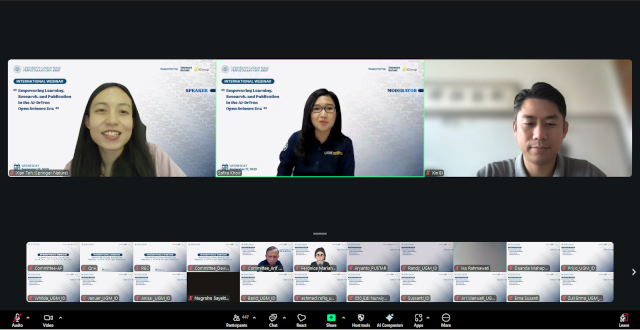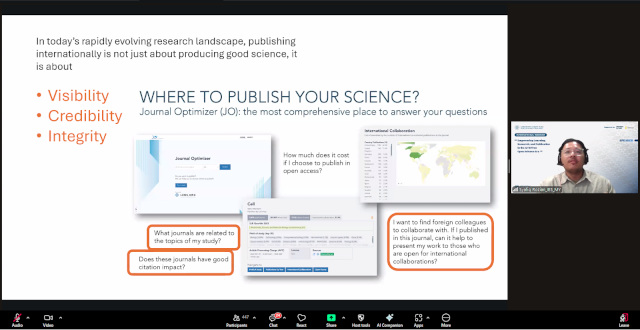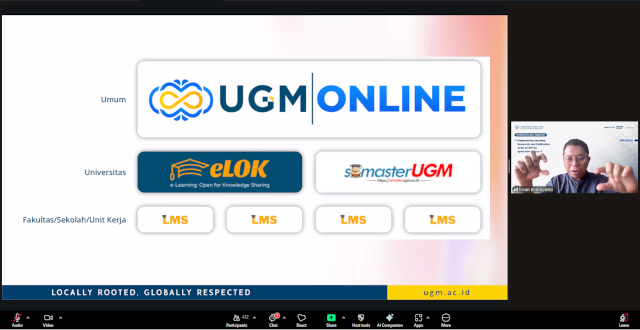The role of Artificial Intelligence (AI) in driving the transformation of research and scientific publishing took center stage at the International Webinar “Empowering Learning, Research, and Publication in the AI-Driven Open Science Era,” organized by the UGM Library and Archives on Wednesday (17/9). This event is part of the Gadjah Mada Library and Archives Fair (GMLAF) 2025 series.

Held virtually via Zoom, the event brought together experts from various countries. The webinar served as an important platform to discuss opportunities, challenges, and ethical principles in utilizing AI for the open dissemination of knowledge. Participants from China, Taiwan, Malaysia, Singapore, the Philippines, and Indonesia also joined, reflecting global enthusiasm for the integration of AI and Open Science.
In his remarks, Prof. Dr. Wening Udasmoro, SS., M.Hum., DEA., the Vice-Rector for Education and Teaching at UGM expressed appreciation to the Library and Archives for initiating this strategic forum and to the international speakers for sharing their knowledge and experience. He emphasized that advances in AI and the application of
Open Science principles have transformed how knowledge is created, managed, and disseminated. “AI speeds up literature searches, data analysis, and writing, while challenging us to uphold ethics and ensure fair access to research. Libraries and archives are key partners in helping academics master digital skills and publication ethics,” he said
The webinar featured speakers from academia and global publishing: Muhammad Syafiq bin Rozian (iGroup), Dr. Irwan Endrayanto Aluicius (UGM), Shu Xian Toh (Springer Nature), and Dr. Xin Bi (Xi’an Jiaotong-Liverpool University). Discussions were divided into two sessions: higher education and library perspectives on international publication, and issues of academic integrity amid the development of AI and open access.
The event was moderated by Safirotu Khoir, Ph.D., Head of Public Relations and International Cooperation at the UGM Library and Archives, and a lecturer at UGM’s Graduate School. With her expertise, she guided the discussions in both sessions smoothly and interactively.
In his presentation, Dr. Irwan Endrayanto Aluicius underscored the importance of sharing knowledge for collective progress. “We believe that knowledge is the most powerful when we share it. Sharing knowledge empowers communities, drives innovation, and strengthens humanity. So, we should remain locally rooted and globally respected,” he said.

Meanwhile, Shu Xian Toh of Springer Nature highlighted how AI technology and publication ethics must go hand in hand with the sustainability of open access. “Artificial Intelligence offers tremendous opportunities for scholarly publishing, but it also calls for clear ethical standards and a sustainable approach to Open Access,” she noted, emphasizing the need to balance innovation and integrity in academic publishing.

Closing the event, Arif Surachman, SIP., MBA., Head of the UGM Library and Archives, expressed his appreciation to all speakers, the moderator, and participants. He reaffirmed that the webinar reflects UGM’s commitment to supporting the advancement of learning, research, and publishing through ethical use of technology.
Beyond expanding international networks, the event also emphasized the importance of global publication literacy, research ethics, and strategic collaboration between universities and reputable publishers. This initiative aligns with the Sustainable Development Goals (SDGs)—specifically SDG 4: Quality Education, by strengthening academic capacity and adaptability to technological progress to enhance the quality of teaching and research, and SDG 9: Industry, Innovation, and Infrastructure, which promotes education quality and knowledge-based innovation.
Through this forum, the UGM Library and Archives aims to reinforce its role as a knowledge management center adaptive to technology, while serving as a strategic partner for the academic community in navigating the era of AI-driven open knowledge. The webinar also served as a momentum to foster awareness of the importance of ethics, transparency, and global collaboration in managing scientific knowledge.
Contributor: Wasilatul Baroroh
